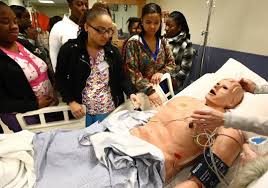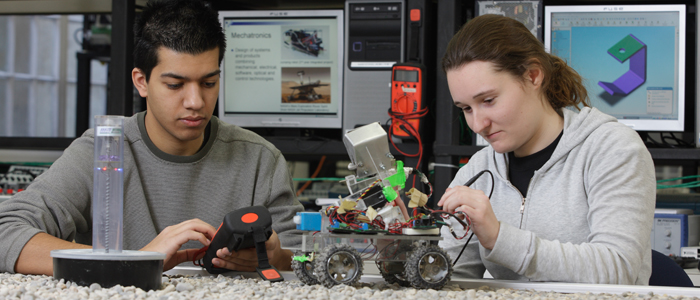By Corinne Alfeld, Program Officer, NCER
February is Career Technical Education (CTE) month and there is certainly cause to celebrate for those who value CTE. After years of being marginalized in K-12 education and education research, CTE programs and offerings are growing across the country.
Once known as “vocational-technical education,” CTE has undergone a transformation in the last decade that keeps pace with changes in workforce. High schools now offer elective CTE courses such as agricultural science, business entrepreneurship, computer graphic design, culinary arts, communications, health care, and mechatronics. High school CTE courses have the ability to provide a context for students to explore possible careers, test their interests and abilities, apply academic knowledge and skills to real-world problems in a more project-based, hands-on way, and learn a useful skill. In other words, CTE can answer the question that many students ask: Why do I need to learn this?

Due in part to employer interest and involvement, CTE has become more of a focus for policymakers and education leaders as a way to ensure students are “college and career ready” when they graduate from high school. In 2015, the Association for Career and Technical Education documented 150 new and revised CTE laws or policies across 46 states. CTE programs are undergoing transformation with newfound vitality and momentum, with new delivery models, such as career academies, in which the entire curriculum is focused on one career area; programs of study that link high school and college courses with workplace experience; and regional CTE centers, which contain specialized equipment shared by multiple schools or districts and focus solely on CTE.
This means that CTE learning opportunities for students may range from a single introductory course in a traditional high school setting to a highly coordinated curricular experience of classroom- and work-based learning, culminating in a capstone project.
As CTE becomes a larger part of the current education landscape, policymakers and practitioners need better evidence to guide their decision-making, especially given limited resources. For example, more research is needed on the following:
- The relationships between specific career-focused school, program, or curricular features and student education outcomes;
- Longitudinal pathways and outcomes for students enrolled in K-12 CTE programs (e.g., postsecondary education and employment);
- Development of effective career-oriented programs or policies designed to support students’ career readiness outcomes;
- Rigorous evaluation of existing career-focused schools or programs, including career technical programs of study, career academies, and other K-12 CTE delivery models;
- Rigorous evaluation of state or district policies or reforms to support career technical education at the K-12 level, including the awarding of vocational diplomas, the use of career readiness measures, career academy models, awarding academic credit for CTE courses, and CTE teacher certification requirements; and
- Development or improvement of measures of technical, occupational, and career readiness skills.
There are certainly challenges in studying CTE. In addition to the wide variety of CTE courses being offered, the range and quality of instructional CTE offerings can vary within and across schools.

Researchers must struggle with questions, such as what is the treatment? How does one account for self-selection bias? Who are the counterfactuals? What are reliable and valid (and meaningful) outcome measures? How soon can effects be seen? As CTE expands in our K-12 education system, the field is in need of creativity and perseverance from researchers to overcome these challenges and build a robust body of both descriptive and causal evidence on which education leaders and policymakers can make decisions.
If you have ideas for CTE research projects, NCER would love to hear from you. Please contact Research Scientist Dr. Corinne Alfeld (corinne.alfeld@ed.gov or 202-245-8203) to share your thoughts or ideas.